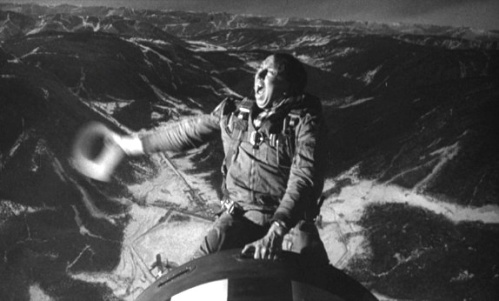At first, it sounded like the smartest guy in the room had just made an awesomely smart observation.
Social psychologist Sheldon Solomon, on a panel this week discussing the world’s failure to tackle climate change on CBC Radio’s The Current, noted that humans are deeply in denial about death, and that they express this denial with distractions like consumerism or obsessively following their favourite sports team.
So that’s why we’re standing on the edge of the climate change cliff, about to collectively jump — we’re in death denial, too busy shopping or fixating over the Leafs’ latest blow-out.
Solomon’s death denial theory may shed light on some aspect of human behaviour.
But on the question of why the world isn’t dealing with climate change, his observation is about as helpful as noting that humans have trouble accepting the death of Elvis. (We don’t.)
Nor are we in denial about the catastrophic potential of climate change — a message driven home vividly again this week with the release of the latest report from the Intergovernmental Panel on Climate Change (IPCC).
Yet commentators often put forward variations of Solomon’s theory — that it is we ordinary people, with our self-absorption or resistance to change, who are the prime culprits in the world’s failure to act against climate disaster.
But is that really the case?
It’s true that ordinary people aren’t running out en masse to buy electric cars, but they almost certainly would be if government, for instance, redesigned our incentive system so that it was really expensive to drive gas-guzzlers and really cheap to drive electric cars.
Instead, Ottawa does virtually the opposite, subsidizing the oil and gas industry by about $2 billion a year through the tax system, according to the Alberta-based Pembina Institute.
And while there are outlets for recharging electric cars across the country, locating one can be as challenging as finding a senator at a Liberal caucus meeting.
By focusing on the alleged failure of ordinary people to tackle climate change, we take our eyes off the real culprits behind the drapes — the fossil fuel industry and lickspittle governments, the best example being in Ottawa.
Big Fossil is the wealthiest and most powerful lobby in world history. Any serious attempt to tackle climate change would involve it giving up future profits that are truly staggering.
That’s because, according to the International Energy Agency and other authoritative sources, at least two-thirds of the world’s fossil fuel reserves will have to stay in the ground if there’s any hope of meeting the widely-agreed target of limiting warming to 2 degrees Celsius (so far we’ve warmed the planet by just 0.8 degrees, and that seems to be working out just fine, right?).
Since Big Fossil owns the rights to those reserves, leaving them in the ground would mean it would have to walk away from trillions of dollars — about $20 trillion, according to U.S. environmentalist Bill McKibben.
That explains why Big Fossil has systematically sabotaged and effectively killed the UN-orchestrated international negotiations that are key to reaching a global climate solution, as well documented in Corporations, Climate and the United Nations, published by the Ottawa-based Polaris Institute.
Canada’s role in the climate debacle is particularly galling, given that we are sitting on one of the world’s biggest and dirtiest deposits of oil.
It’s a horrific bit of bad luck that, at this crucial moment in history, with time running out on the climate-change clock, the world community is stuck with an aggressively renegade government in Ottawa, whose crass loyalty to Big Oil has made Canada part of the machinery of obstruction.
Stephen Harper’s government has undermined international climate negotiations, gutted Canada’s environmental review process, targeted environmental groups with harassing audits and championed unbridled oil sands development.
Its craven devotion to Big Fossil has made it a perennial recipient of the Fossil of the Year Award, disdainfully awarded each year by the Climate Action Network, a global association of more than 850 environmental groups.
The latest IPCC report provides yet more evidence of climate change’s potential to be a weapon of mass destruction, leading to global conflicts.
A 2003 Pentagon-commissioned study made the same point, noting that global warming would lead to widespread human strife…”once again, warfare would define human life.”
By comparison, the prospect of having to refuel at an electrical outlet rather than a gas station sounds manageable.
Come to think of it, maybe there is something to the death denial thing. How else to explain Stephen Harper’s zealous, almost messianic championing of unlimited fossil fuel development in the face of near-certainty that it will lead to death and untold human misery.
In comparison, that old petro-warrior Dick Cheney looks almost restrained and public-spirited.
Like the crazy-loon cowboy whooping it up as he rides a nuclear warhead to oblivion in the 1964 classic Dr. Strangelove, Stephen Harper can almost be heard slapping his sides and yelling “hee-haw” as he leads us all right over the climate cliff.
Winner of a National Newspaper Award, Linda McQuaig has been a reporter for the Globe and Mail, a columnist for the National Post and the Toronto Star and author of seven bestsellers, including Shooting the Hippo: Death by Deficit and other Canadian Myths and It’s the Crude, Dude: War, Big Oil and the Fight for the Planet. Her most recent book (co-written with Neil Brooks) is The Trouble with Billionaires: How the Super-Rich Hijacked the World, and How We Can Take It Back.
This article is reprinted with permission from iPolitics ![]()
Photo: wikimedia commons



